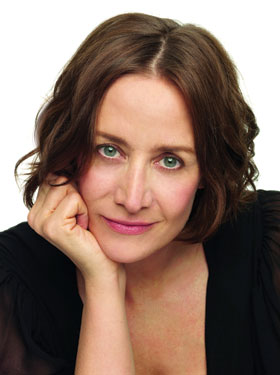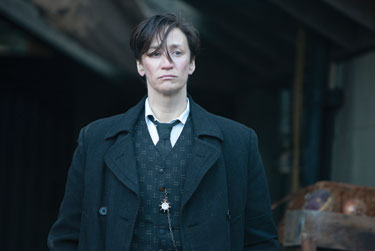METRO WEEKLY: Though they share a similar circumstance, Hubert is the polar opposite of Albert. What was your approach to the character?
JANET McTEER: Apart from being a character that you want to flesh out and create and do something lovely with, you also have to look at the entire piece and say, ''What is my character's function in this piece given that the main storyline is Albert's? What's the function of my character?'' And the function of Hubert, I felt, was to be the absolute antithesis of Albert Nobbs. So everything that Albert wanted to be -- happy, content, at peace with a home, with a partner, and yet somehow comfortable in her own skin -- that's what I wanted to create. Somebody with immense confidence, with no fear of being discovered -- a warm, friendly, happy, completely contented human being.

Janet McTeer
(Photo by Robert Ascroft)
So I felt that if that was the case, how does the character get there? Clearly, she was once married and clearly Hubert's husband wasn't very nice to her and bashed her about. In my imagining of her backstory, Hubert got dressed up as a fellow to get a job in unbelievably poverty-stricken Ireland. I think there were things you can look back on in your life and say, ''Yeah, makes sense that I did that now even though I don't know why I did it then." I think she got dressed up as a guy and realized that she was way more comfortable like that. That that was really her. And she met Kathleen, and at some point was like, ''Well, I might as well tell her the truth." She realized she was in love with Kathleen and Kathleen didn't seem to mind and suddenly they were really happy.
And I'm sure that Hubert would look back and go, ''You know what, I could have gone out and got a job as a domestic, but I didn't. I got dressed up as a guy because really I wanted to."
MW: Was there a specific kind of presence you wanted to bring to Hubert?
McTEER: I wanted Hubert to be a very particular kind of bloke -- one of those barrel-chested, sort of Viking Irish working class. They're just as soon gentle as they'd punch you in the face. If I had my choice, I'd have had hands the size of Liam Neeson. You know, big hands. But I didn't. I have relatively delicate hands, so I kept them in my pocket for most of the whole performance.
I wanted Hubert to have all of the qualities of both women and men, a real happy combination of the yin and yang, you know, all the lovely, warm, nurturing things that we associate with motherhood, with femininity. She's very, very empathetic and helpful with Albert and then, of course, at the very end with Helen.
MW: One of the scenes Ms. Close and I discussed was the beach scene.
McTEER: Isn't it great? Women in drag as men in drag as women? Unbelievably good fun.
MW: And yet so uncomfortable, especially for Hubert, who exudes nothing but awkwardness.
McTEER: I wanted Hubert to look like Hubert was still a man in drag. I personally found it funny the idea that she would dress as a man essentially in drag, and then when you put Hubert in a dress, she would still look like she's in drag. It just appealed to my sense of humor hugely. It was hysterical and yet somehow we then had to try and make it poignant.
MW: I'd like to hear your thoughts on one of the movie's unanswered questions: Do you think Hubert told Kathleen that she was a woman before or after marrying her?
McTEER: Oh, definitely before. Because I don't think Hubert's a deceptive person. I think probably they became great friends and I think probably Hubert fell in love with her and then there was a moment when Hubert realized that Kathleen was falling in love with Hubert and I'm sure, because Hubert is just too nice, Hubert would have said, ''I have to tell you, I'm a girl, I'm not a boy.'' And it was fine, and then they got married.
MW: The film clearly deals with issues of gender identity and lesbianism, but it does so in an almost nondescript way.
McTEER: The film exists in a time before labels. We can all say, ''Oh, I'm straight, I'm gay, I'm transgender, I'm transsexual, I'm something else, I'm something else.'' We have labels for everything. And I think that it was in a time before labels when nobody ever particularly spoke about it, certainly not women living as men -- I think that was pretty rare. There were a few documented cases and of course, there must have been a lot more than we know about, but really not that many.
You can look at Albert and say, ''Well, what is Albert?'' I personally think Albert was kind of asexual, and whether that's because Albert had such a horrific past or whether it's because Albert is in fact a gay woman or you know, somebody who prefers to live as a man, I have absolutely no idea. And I'm not even sure that Hubert knew, because in the scene after the dress, when Hubert says to Albert, "You have a right to be who you are, and if you want to find somebody to love, go out and find that person. You're a really good catch" -- within that there is no pronoun, there is no ''her," no ''go and find her" or "find him.'' None. Hubert doesn't judge, and I think that is so spectacularly ultramodern. I love her. Of course, in a utopian society that's where we'd all be.
Who cares? Who cares as long as it's all about love? That's what I tell the kids in my family. Who cares? It doesn't matter if girls love girls and boys love boys. Who cares as long as you all love each other? That's all that matters, really.
MW: Well, unfortunately, there are a lot of people who care -- or, rather, make it their business to care, often in a negative way.
McTEER: Well, that's one of the reasons why I wanted Hubert to be rounded and live happy. Is it partly a minor political statement? Of course it is. You make choices when you create a character and I wanted Hubert to be a spectacularly happy human being. I've been asked if it's a lesbian movie, is it a transgender movie, and I go, ''They existed in a time before labels. It has no label.'' That's the whole point. One shouldn't have to label oneself in this day and age or that day and age. It's a story about battered women, one of whom becomes spectacularly happy, one of whom ends up very pregnant and you know, completely abandoned. It was a time of awfulness. And the characters rose above it. And that's ultimately what it's about, and finding peace with yourself. I think that's pretty awesome whatever your social preference.
MW: You're also featured in the fifth season of Damages, which you're currently shooting. What's it like working with Glenn Close?
McTEER: Just great. We've become very good friends in the time since she first brought me into the film, which is over two years ago now. She is deceptively not what you would imagine, if you only know her from her work. She is tiny, first off. She's played all of these hugely massive characters, very important, really powerful characters. And in real life she's about 4'9'' and very sweet and very cuddly and pretty and is just always laughing and smiling. She's an absolute delight.
And she's also a perfectionist -- which I also am. Once she gets on the [set], she's just another working actress. She doesn't pull any starry shit. She just does her job and she does it to the best of her ability. We talked about the character of Hubert quite a lot, and she was completely open to whoever had the best idea. She wasn't precious about this. She wanted the film to be the best it could be and if your idea was better than hers, fine. And that takes great openness. And she and I both enjoy doing jigsaw puzzles and drinking Guinness, both of which we did quite a lot in Ireland, let me tell you.
MW: Jigsaw puzzles? These days most people play video games.
McTEER: I know. I'm a troglodyte, really. I don't have television in my house and I watch things on Hulu the following day if I have to. I read books. I'm a parody of myself, I really am.

Janet McTeer in ''Albert Nobbs''
MW: May I ask your age?
McTEER: I'm 50.
MW: Wow, you look 35. What's your beauty secret?
McTEER: Happiness. [Laughs.] That's the answer, just be happy. I'm ludicrously happy. I think life is wonderful. I have an incredibly lovely, lucky life and I never take it for granted, ever.
MW: Maybe we should put you up for president. It would be a feel-good platform.
McTEER: You know, I was a little girl I wanted to be a ballerina and prime minister. I remember saying to my mother, ''I want to be a ballerina and in my spare time I want to be prime minister.'' I don't think I quite got the measure of the job.
MW: As an actor, what has Albert Nobbs taught you about the human condition?
McTEER: It's taught me that I'm right to continue to attempt to live my life as a nonjudgmental person. I'd always thought that the one thing that being an actress teaches you more than anything else is compassion. Because by definition, you have to stand inside any character that you play and try to imagine what it is like to be them. And you have to meet them somewhere in the middle. So I think the answer is that more than anything else, acting always teaches me more compassion for the human condition and for how hard it is very often for the ordinary person to get through an ordinary day.
Albert Nobbs (Rated R, 113 minutes) is now playing in area theaters.
Continue reading:
Interview with Glenn Close Introduction ...more